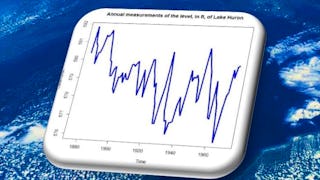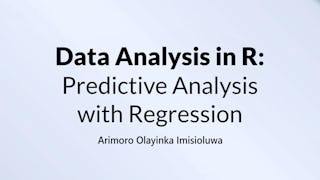By the end of this course, learners will be able to define the fundamentals of forecasting, classify forecasting methods, apply regression and decomposition techniques, and implement advanced models like ARIMA and SARIMA to accurately predict time-dependent data.



Ce que vous apprendrez
Define forecasting fundamentals and classify methods for time-dependent data.
Apply regression, decomposition, and exponential smoothing in R.
Implement ARIMA and SARIMA models with ACF/PACF diagnostics for accuracy.
Compétences que vous acquerrez
- Catégorie : Time Series Analysis and Forecasting
- Catégorie : Statistical Methods
- Catégorie : Predictive Analytics
- Catégorie : R Programming
- Catégorie : Statistical Modeling
- Catégorie : Forecasting
- Catégorie : Analysis
- Catégorie : Statistical Analysis
- Catégorie : Predictive Modeling
- Catégorie : Exploratory Data Analysis
- Catégorie : Regression Analysis
- Catégorie : Business Analytics
- Catégorie : Advanced Analytics
- Catégorie : Trend Analysis
Détails à connaître

Ajouter à votre profil LinkedIn
septembre 2025
11 devoirs
Découvrez comment les employés des entreprises prestigieuses maîtrisent des compétences recherchées

Il y a 3 modules dans ce cours
This module introduces learners to the fundamental principles of forecasting within the field of business analytics. It explains the purpose and scope of forecasting, explores different forecasting methods, and highlights common challenges businesses face when predicting future trends. Learners will also gain practical insights into simple forecasting approaches, transformations, and accuracy evaluation techniques, building a strong foundation for advanced forecasting models.
Inclus
12 vidéos4 devoirs1 plugin
This module explores how regression techniques and decomposition methods can be applied to time series forecasting. Learners will gain an in-depth understanding of simple, multiple, and non-linear regression, the use of predictors and lagged variables, and the unique considerations of time series regression. The module also introduces decomposition approaches to separate time series into trend, seasonal, cyclical, and irregular components, helping learners build accurate and interpretable forecasting models in R.
Inclus
12 vidéos4 devoirs
This module focuses on advanced time series forecasting techniques, including exponential smoothing, ARIMA, and Seasonal ARIMA models. Learners will explore the theoretical foundations and practical applications of autoregressive and moving average models, understand the role of ACF and PACF in model selection, and learn how to handle seasonal and non-seasonal time series data. By mastering these advanced methods, learners will be able to build robust and accurate forecasting models in R that address both short-term fluctuations and long-term seasonal trends.
Inclus
8 vidéos3 devoirs
En savoir plus sur Data Analysis
 Statut : Essai gratuit
Statut : Essai gratuitCoursera Instructor Network
 Statut : Prévisualisation
Statut : PrévisualisationThe State University of New York

Coursera Project Network
Pour quelles raisons les étudiants sur Coursera nous choisissent-ils pour leur carrière ?





Ouvrez de nouvelles portes avec Coursera Plus
Accès illimité à 10,000+ cours de niveau international, projets pratiques et programmes de certification prêts à l'emploi - tous inclus dans votre abonnement.
Faites progresser votre carrière avec un diplôme en ligne
Obtenez un diplôme auprès d’universités de renommée mondiale - 100 % en ligne
Rejoignez plus de 3 400 entreprises mondiales qui ont choisi Coursera pour les affaires
Améliorez les compétences de vos employés pour exceller dans l’économie numérique
Foire Aux Questions
To access the course materials, assignments and to earn a Certificate, you will need to purchase the Certificate experience when you enroll in a course. You can try a Free Trial instead, or apply for Financial Aid. The course may offer 'Full Course, No Certificate' instead. This option lets you see all course materials, submit required assessments, and get a final grade. This also means that you will not be able to purchase a Certificate experience.
When you purchase a Certificate you get access to all course materials, including graded assignments. Upon completing the course, your electronic Certificate will be added to your Accomplishments page - from there, you can print your Certificate or add it to your LinkedIn profile.
You will be eligible for a full refund until two weeks after your payment date, or (for courses that have just launched) until two weeks after the first session of the course begins, whichever is later. You cannot receive a refund once you’ve earned a Course Certificate, even if you complete the course within the two-week refund period. See our full refund policy.
Plus de questions
Aide financière disponible,




